| | | | | | | | | | | Axios World | | By Dave Lawler ·Feb 17, 2022 | | Welcome back to Axios World. - You probably won't be surprised by the primary focus of today's edition (1,955 words, 7½ minutes). The Ukraine package was written with the help of Axios' indefatigable national security reporter Zach Basu.
- What else do you want to read? The Ukraine crisis is hard to ignore, but drop me a note if there's another topic you'd like us to explore in the coming weeks.
New arrival? Subscribe. | | | | | | 1 big thing: U.S. lays out Putin's invasion playbook | 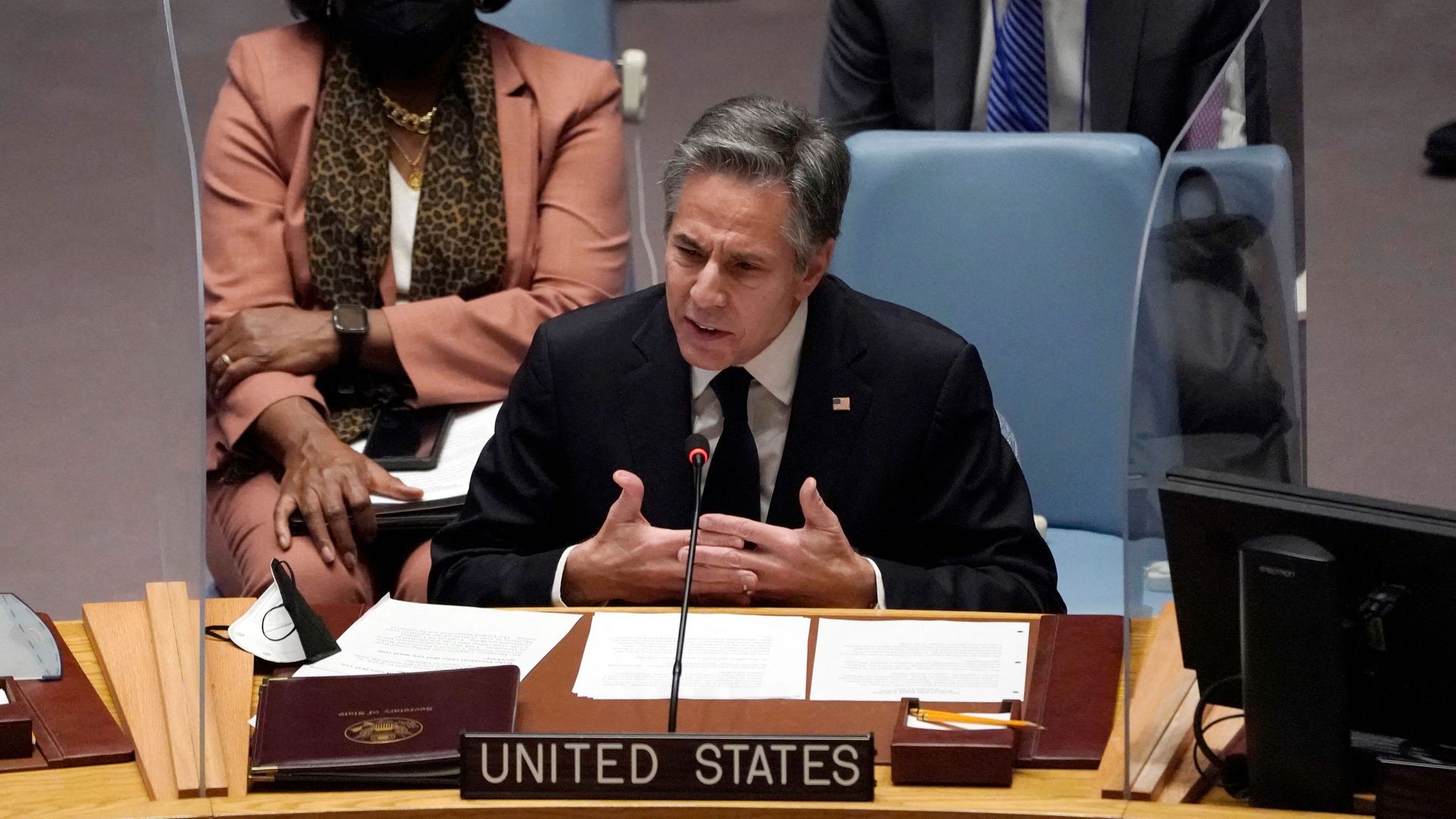 | | | Blinken addresses the UN Security Council. Photo: Timothy A. Clary/AFP via Getty | | | | Senior U.S. officials pivoted today from warning of the threat that Russia could soon invade Ukraine to the firm expectation the invasion is about to begin. What they're saying: "If Russia doesn't invade, we will be relieved that Russia changed course and proved our predictions wrong," Secretary of State Tony Blinken said today. But both he and President Biden made quite clear that they believe Vladimir Putin has chosen war, and Blinken went so far as to present the playbook the U.S. expects Putin to follow. First, Blinken told the UN Security Council, Putin will need a pretext. - That could involve a "violent event" precipitated by Russia or "an outrageous accusation" against Ukraine, Blinken said.
- He cited the possibility of a fabricated terrorist bombing, drone strike against civilians or chemical weapons attack. Blinken also said Russia could falsely claim that "ethnic cleansing or a genocide" is taking place in Eastern Ukraine, or stage the discovery of a mass grave.
- The latest: Such claims are already being shared by Russian state media and Kremlin officials, including Putin himself.
Second, Blinken warned "the highest levels of the Russian government may theatrically convene emergency meetings to address the so-called crisis" and proclaim the need to rise up and defend Russian citizens or ethnic Russians in Ukraine. Third, the attack will begin with Russian missiles and bombs across Ukraine, jammed communications and cyberattacks designed to shut down "key Ukrainian institutions," Blinken said. - The latest: The websites of Ukraine's Defense Ministry and two major banks were knocked offline temporarily on Tuesday by a cyberattack, though no sensitive systems appear to have been affected.
Fourth, "Russian tanks and soldiers will advance on to targets that have already been identified and mapped out in detailed plans," including Kyiv. - The latest: U.S. officials now estimate the troop count near Ukraine's borders at 150,000. Secretary of Defense Lloyd Austin said today that Russian troops were "inching closer" to Ukraine's border and "stocking up their blood supplies." Satellite images have also shown a new military pontoon bridge in Belarus, less than 4 miles from the Ukraine border.
- "Every indication that we have is that they are prepared to go into Ukraine," Biden told reporters today. He said he expects an invasion "in the next several days," but there is still a "path to diplomacy."
That path appears to be growing shorter. - Russia formally replied today to the security proposals the U.S. and NATO presented last month, saying they "ignored" Russia's core concerns, such as NATO expansion, and that Russia would be forced to take "military-technical" steps in response. Moscow has also expelled a senior U.S. diplomat.
- At today's UN hearing on the Minsk accords, which were signed in 2014 and 2015 as part of the effort to resolve the ongoing war in eastern Ukraine, Blinken's remarks were preceded by a combative address from Russia's deputy foreign minister.
- He argued that Ukraine was trampling on the agreements — which call for a "special status" for the separatist-claimed areas of eastern Ukraine, but which Ukraine argues were signed under military duress — with the acquiescence of the West.
What to watch: While in Moscow this week, German Chancellor Olaf Scholz hinted at two potential off-ramps: making clear that Ukraine will not join NATO anytime soon, and pressuring Kyiv to move forward on Minsk. - It remains unclear whether Western leaders could engineer a diplomatic off-ramp that satisfies Putin, or how long they might have to try.
|     | | | | | | Part II: "It's not such an easy decision" | 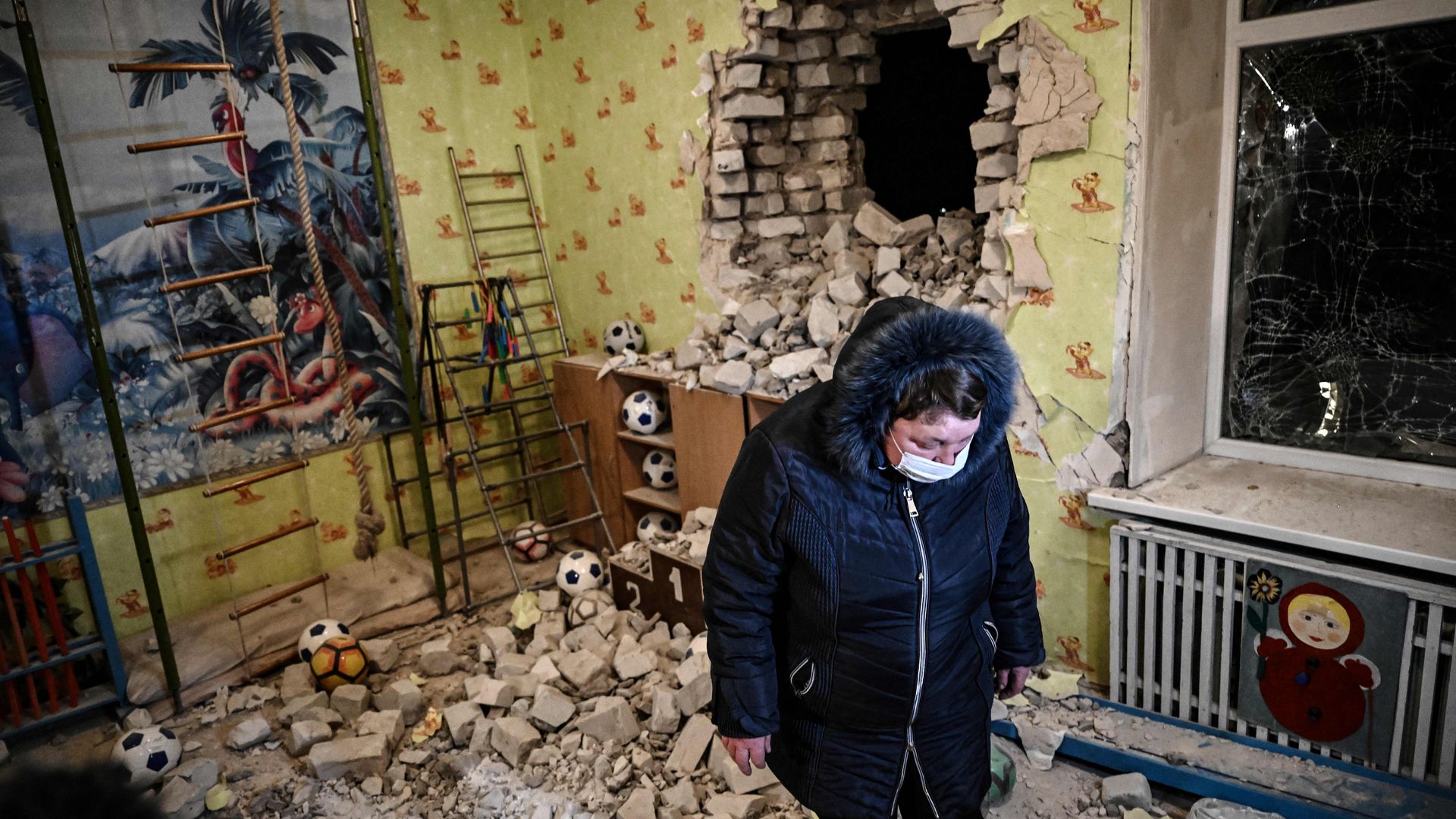 | | | The aftermath of the reported shelling of a kindergarten in Stanytsia Luhanska. Photo: Aris Messinis/AFP via Getty | | | | Meanwhile, Russian officials and state media have been jeering the Biden administration over the fact that the date it pinpointed for a potential invasion came and went on Wednesday. - The Kremlin continues to insist it has no plans to invade Ukraine, though Blinken noted that it hasn't explicitly ruled out such a scenario or followed through in any meaningful way on the announcement that troops would move back from the border.
Between the lines: The U.S. has consistently attempted to call out the plays it expects Putin to run ahead of time, hoping to deny him the narrative that the war was forced upon Russia. - While the U.S. and U.K. appear convinced that war is coming, some analysts believe Putin is still keeping his options open.
- Alexander Baunov of Carnegie Moscow tells Axios that a full-scale invasion of Ukraine would not be an easy sell for Putin domestically, in part because so many Russian citizens have relatives in Ukraine.
- "It's not such an easy decision," Baunov says. "It maybe doesn't look this way from the outside, but from inside [Russia], to start a large-scale invasion of Ukraine without being provoked by something convincing — you can threaten it, but to move is a different thing."
The bottom line: The Biden administration made clear today that it expects Putin to move from threats to action very soon. |     | | | | | | Part III: The war that's already happening |  Data: Mapbox/OSCE as of Feb. 14, 2022; Map: Will Chase/Axios The low-grade war that's already underway in Ukraine threatened to escalate today as international monitors reported shelling across the line of contact in the east. The big picture: Ukraine has since 2014 been battling pro-Russian separatists who've declared independent "republics" in Donetsk and Luhansk (see map). Around 1,400 people have been killed in the fighting. Driving the news: A kindergarten in the Ukrainian-controlled town of Stanytsia Luhanska was struck, though the children had been evacuated and no one was killed. President Volodymyr Zelensky called that a "big provocation." - Meanwhile, Kremlin spokesperson Dmitry Peskov accused Ukrainian government forces of preparing a major offensive against the separatist-controlled territory, which Kyiv has denied.
- At the UN, Russia is circulating what it describes as an investigation into war crimes committed by Ukrainian forces during the war. A senior U.S. official called those allegations "categorically false," but warned they could be used to further build a pretext for war.
What to watch: The Russian state Duma passed a resolution this week calling on Putin to recognize the separatist republics. - That would suggest a Russian withdrawal from the Minsk accords and could foreshadow military intervention from Moscow because the separatists do not control all of the territory they claim.
- Blinken said Russia would face "a swift and firm response" if Putin acts on the resolution, in a statement that was echoed by several European allies.
- "The Duma provides Putin with possibilities," Baunov says, but that doesn't mean he intends to take them.
|     | | | | | | A message from Axios | | Start a new morning habit. | | |  | | | | Every weekday, host Niala Boodhoo catches you up quick on the latest news and interesting stories you won't hear anywhere else. In 10 minutes, you'll hear the latest in US and world news. Listen now for free. | | | | | | Bonus: Where in the world? | 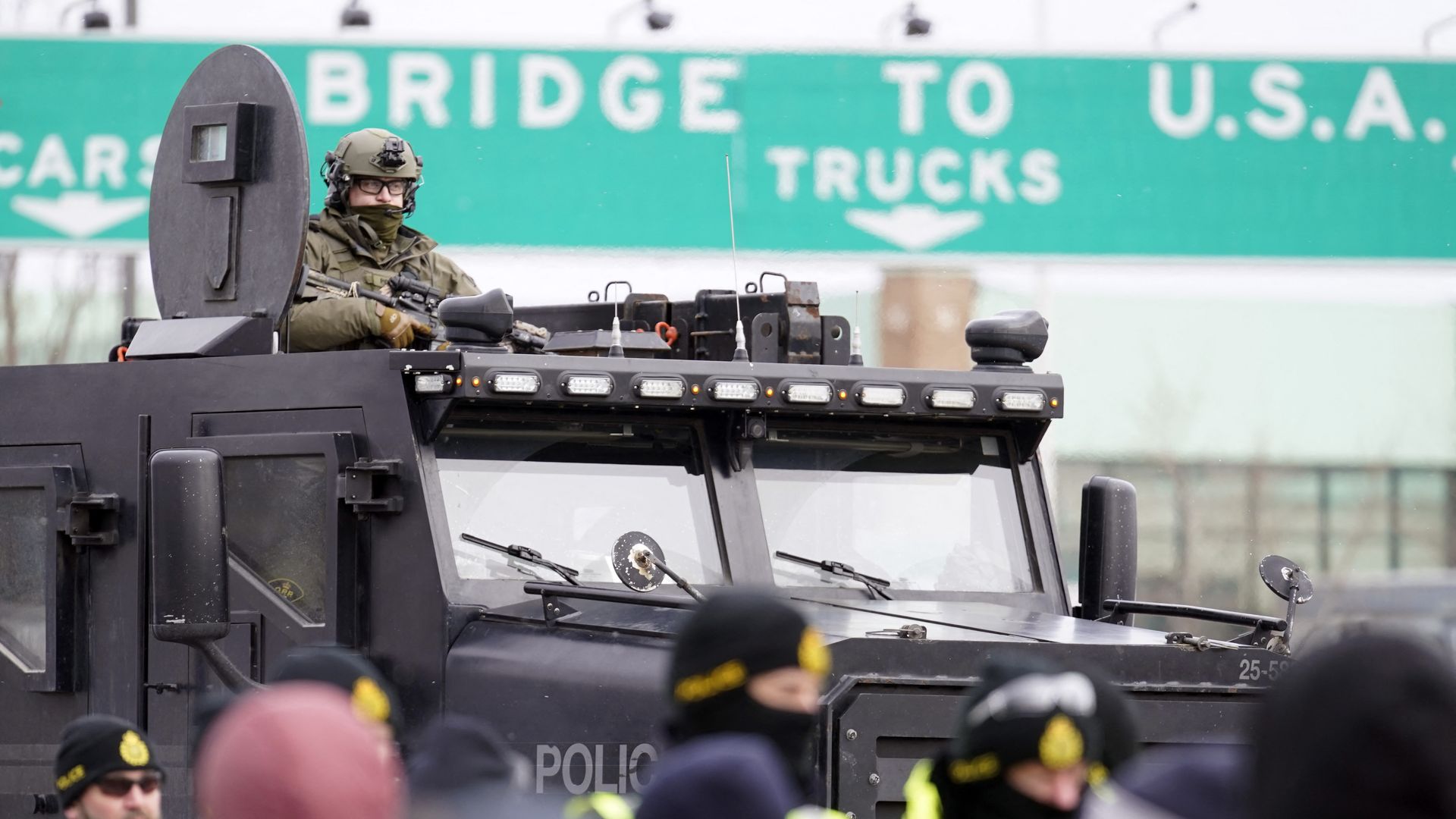 | | | Canadian police move protesters off of Ambassador Bridge last week. Photo: Geoff Robins/AFP via Getty | | | | Today we're visiting "twin" cities, but not in Minnesota. Can you name them all based on the clues? - The two halves of one of Europe's major cities, back when it was divided by a wall.
- An ancient city founded by a twin who killed his brother, according to legend.
- Two border cities that share a name, and a giant waterfall.
- Two cities on that same border, connected by Ambassador Bridge (the one protestors recently blocked).
- Neighboring cities on America's southern border, between Texas and Mexico, with a combined population of nearly 3 million.
- A global center of finance and, more recently, protest, plus the city next door on the mainland.
- A Central European capital that consists of two cities squished together (so does its name).
- Two cross-border Scandinavian cities separated by a strait and connected by a bridge. (There's a detective show about it).
- South Korea's first- and third-largest cities, which border one another.
- Two African capitals, separated by the Congo River.
Scroll to the bottom for the answers. |     | | | | | | 4. African news roundup: France exits Mali | 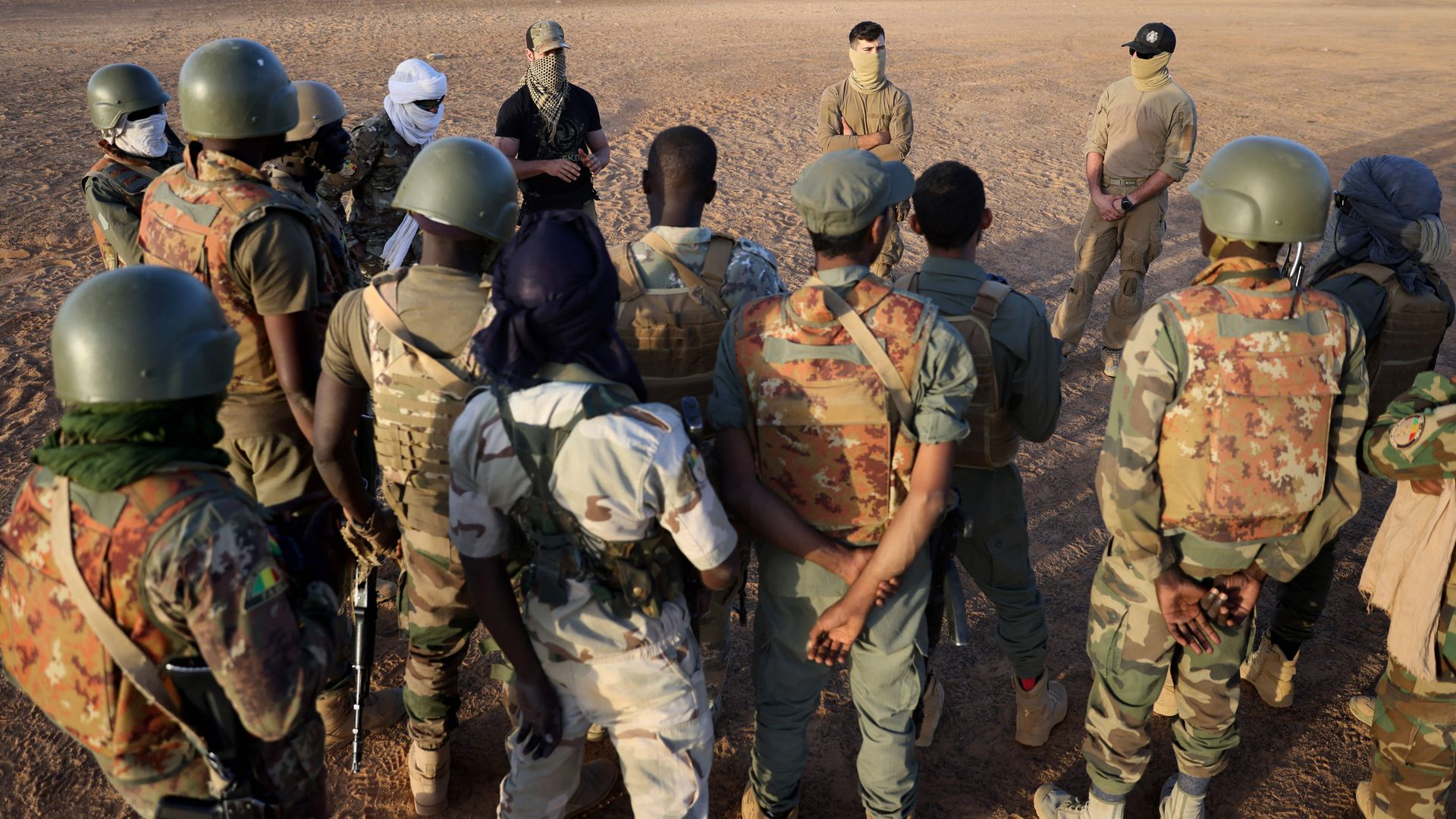 | | | French marines train Malian soldiers in Dec. 2021. Photo: Thomas Coex/AFP via Getty | | | | 1. President Emmanuel Macron today announced a withdrawal of French troops from Mali after nearly a decade of fighting Islamist insurgents there. The big picture: The French intervention in Mali — sometimes compared to America's war in Afghanistan — had grown increasingly unpopular at home and in Mali, where the ruling junta has clashed with Paris and turned to Russian mercenaries. - "We cannot remain militarily engaged with de facto authorities whose strategy and hidden objectives we do not share," Macron said at a press conference announcing the decision. He suggested France would redeploy forces to Niger.
- The exit is humbling for France, which faces stiff competition for influence from Russia and China in its former colonies in Africa.
2. Conscious of that competition for influence, the EU hosted 40 African leaders for a summit in Brussels today aimed at resetting relations. - The EU, which has faced criticism in Africa for vaccine hoarding during the pandemic, offered a variety of support packages and a "300 billion euro ($341 billion) investment drive launched to rival China's Belt and Road Initiative," per Reuters.
3. Flutterwave, a Lagos-based digital payments platform, has raised $250 million in investment at a valuation north of $3 billion, making it the most valuable startup in Africa, Axios' Dan Primack reports. - That news also comes amid a funding boom for fintechs operating in countries like Nigeria, where over half the population is unbanked, Dan notes.
4. The leader of last month's coup in Burkina Faso, Paul-Henri Sandaogo Damiba, was inaugurated as president on Wednesday. - The junta has promised a return to "constitutional order" after a transition period, but it hasn't set a date for elections.
5. Meanwhile in Guinea-Bissau, there has been a crackdown on government critics in the wake of what the government says was a coup attempt by drug traffickers, Deutsche Welle reports. |     | | | | | | 5. What an ex-president's arrest says about U.S.-Latin America relations |  | | | Juan Orlando Hernández (sitting) after his arrest on Monday. Photo: STR/AFP via Getty Images | | | | The dramatic arrest and likely extradition of former Honduran President Juan Orlando Hernández is a stunning fall from grace for a leader once embraced by American authorities desperate to stem migration to the U.S., Axios Latino's Marina E. Franco writes. Driving the news: The U.S. government says Hernández led a "violent, state-sponsored drug trafficking conspiracy" with co-opted armed forces, police, Congress members and mayors. - Unlike other Latin American countries where criminal groups and cartels work with some corrupt officials, U.S. prosecutors suggest the outgoing Honduran government itself became a cartel, a "narco-state."
- The situation also shows the tricky balance Washington keeps in its relations with the Northern Triangle countries of Honduras, El Salvador and Guatemala, working with and giving funds to local governments suspected of corruption when looking to stem migration and promote cooperation.
What's next: A Honduran judge who belongs to Hernández's National Party will decide whether the former president will be extradited. The decision could take months. Go deeper. |     | | | | | | 6. Unusual request from Israel sparks spat with Ukraine | 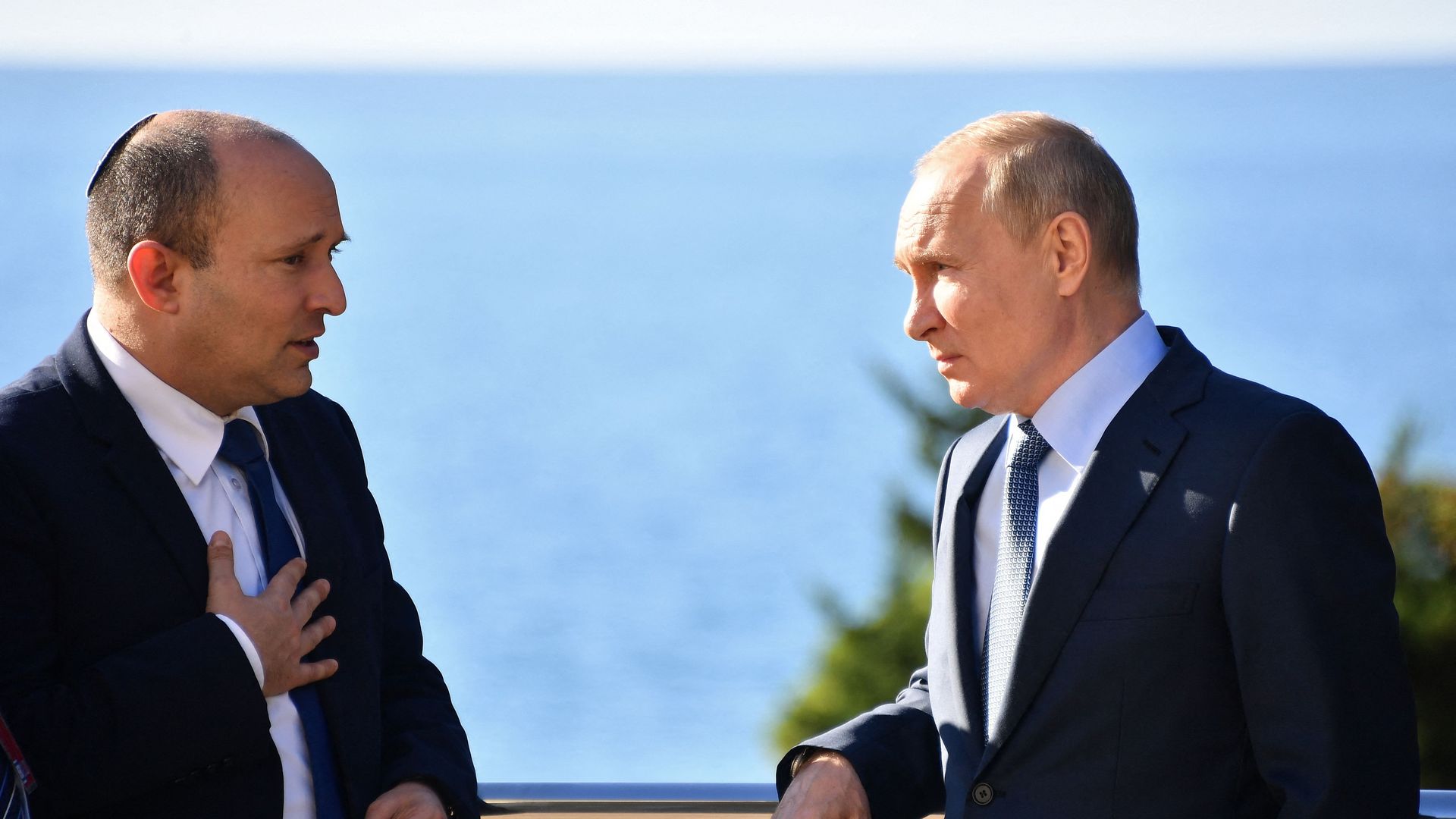 | | | Israeli PM Bennett (left) with Russia's President Putin. Photo: Yevgeney Biyatov/Sputnik via Getty | | | | Ukraine summoned Israel's ambassador in Kyiv today in response to a report from Axios' Barak Ravid that Israel had asked for Moscow's help evacuating its citizens and diplomats if Russia invades. Between the lines: Israel is in the unusual position of having close ties with Russia, Ukraine and the U.S. It has attempted to balance those relationships as it prepares for a potential invasion, but the request for Russian help was clearly unwelcome in Kyiv. - While more than 3,000 Israeli citizens have evacuated since Sunday, the Israeli government believes around 10,000 remain in Ukraine.
- Israeli officials tell Barak that if Russia does invade, Israel wants to ensure it has the ability to open humanitarian corridors for evacuations to neighboring countries.
Go deeper. |     | | | | | | 7. Stories we're watching |  | | | Snow in Tokyo. Photo: Yuichi Yamazaki/Getty Images | | | - Devastating floods and mudslides kill scores in Brazil
- Washington wakes up to Beijing-Moscow alignment
- Russian jets intercept U.S. Navy planes
- Iran says it's up to the Western powers to seal a nuclear deal
- Israel won't cooperate with UN human rights probe
- Prince Andrew settles sexual abuse lawsuit
- Erdoğan seeks reset in unlikely visit to UAE
Quoted: "We know very well who was happy in the Gulf when there was a coup attempt in Turkey." — President Recep Tayyip Erdoğan of Turkey in 2017. He implied at the time that the UAE had helped fund the coup plotters. "Our mutual goal is to carry our bilateral relations to much higher levels in all areas." — Erdoğan on a visit to the UAE this week |     | | | | | | A message from Axios | | Start a new morning habit. | | |  | | | | Every weekday, host Niala Boodhoo catches you up quick on the latest news and interesting stories you won't hear anywhere else. In 10 minutes, you'll hear the latest in US and world news. Listen now for free. | | | | Answers: 1. East Berlin and West Berlin; 2. Rome (founded by Romulus); 3. Niagara Falls (U.S. and Canada); 4. Detroit and Windsor; 5. El Paso and Juarez; 6. Hong Kong and Shenzhen; 7. Budapest (Buda and Pest); 8. Copenhagen and Malmö; 9. Seoul and Incheon; 10. Kinshasa and Brazzaville |  | Bring the strength of Smart Brevity® to your team — more effective communications, powered by Axios HQ. | | | | | | Axios thanks our partners for supporting our newsletters. If you're interested in advertising, learn more here.
Sponsorship has no influence on editorial content. Axios, 3100 Clarendon Blvd, Suite 1300, Arlington VA 22201 | | | You received this email because you signed up for newsletters from Axios.
Change your preferences or unsubscribe here. | | | Was this email forwarded to you?
Sign up now to get Axios in your inbox. | | | | Follow Axios on social media:    | | | | | |













No comments:
Post a Comment